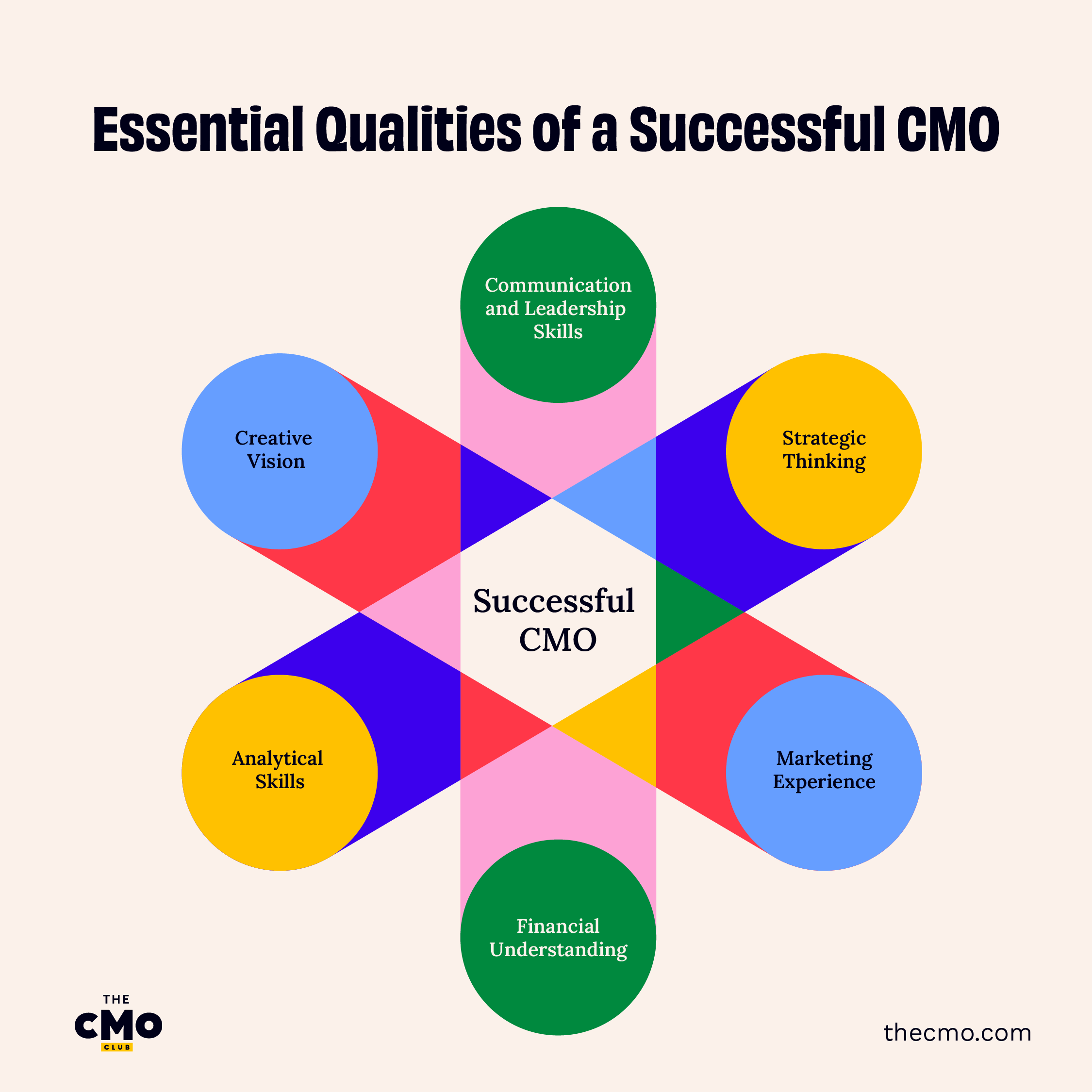Despite the economic anxiety of recent years, Deloitte shows companies have seen an average marketing job growth of 12.2%. Marketing leaders and CMOs (be it fractional or full-time) are still very much in demand, playing a critical role in growing businesses, generating brand awareness, and driving sales.
As a top executive position, the role of Chief Marketing Officer is one that should never be taken lightly. Your CMO will not only be in charge of your marketing efforts, they will also be an integral part of your leadership and marketing team structure, helping shape your company culture.
This is why it's crucial to ask the right marketing interview questions to dig beyond your candidate's interest in the role and their marketing background.
This is also a great toolkit if you are looking to bring on a fractional CMO to support the marketing team.
11 CMO Interview Questions To Ask
You’ve gone over your CMO candidate’s background and experience. You think you have a good sense of how they would fit in your company’s plans.
Take things a step further by asking the following questions, which should reveal quite a bit about how your candidate would operate in their CMO role, how they would fit on the leadership team, and where they see your marketing efforts evolving in the future.
1. Describe the least successful marketing campaign you worked on. What would you do differently?
Most interviewers would likely ask a CMO candidate to outline their most successful marketing campaign. However, you can understand a lot about a candidate’s capabilities by asking them about their failures and how they were able to bounce back from them. Look for notes like:
- What metrics did they use to track their objectives?
- What did they learn from their experience?
- Did they assign blame or take responsibility?
- What would they do differently in the future?
2. Can you pitch us what we do at this company?
This is an interesting exercise. Not only will you get a good idea of the candidate’s understanding of what your business is all about, you’ll also see their pitch process in action. Watch for things like:
- How creative can they be on the fly?
- How well do they respond under pressure?
- What do they see in your brand or business that stands out?
3. What are the biggest challenges for CMOs today?
The marketing field is evolving at breakneck speed. Challenges that were very much front and center yesterday may be much different today (and tomorrow). Make sure your CMO candidate has a good grasp of what’s coming and how it will impact their team. It's worth looking for answers that include:
- How do they stay on top of the latest in the marketing landscape?
- What is the potential impact of these challenges?
- What action plan (if any) have they developed around these challenges?
4. Which new tools and technology have you learned in the past year?
This question ties directly into the previous one. There are 10,000 software tools and platforms available for martech stacks today. Your CMO candidate should not only be able to identify the tech that can drive your business forward, but also what’s on the horizon. You want to gauge the knowledge level and proficiency of your CMO to adapt to your team and your strategy.
- What's the length of their learning curve for new software?
- Which tools and software do they prefer for best performance?
- What features do they find lacking, and how have they worked around it?
5. What would you do on your first day as CMO?
This question allows you to gauge two things: Would your CMO act on their very first day? Or would they take the time to examine how the business operates to draw up a plan? Depending on your needs and preferences, this may reveal how well your CMO fits on your leadership team.
6. How do you think the company will change in the next two years and how do you see yourself shaping that change?
You’re obviously hiring a CMO for the long haul. Getting a clear idea of how they see themselves evolve within their role and your company’s future strategy is essential. This is also a great example of how well they've researched your company. Did they come with fresh new ideas?
7. What do you think is missing in our marketing strategy right now?
Your new CMO should be able to tell you if your marketing strategy contains blind spots or inefficiencies. You want your candidate to have done some thorough research into your marketing plan, your branding, and your campaigns. This also tells you how well they understand the product you’re offering and how they would execute on any opportunities you’re missing.
8. What KPIs do you track?
This tells you the results your CMO prefers and how they measure success. Do they emphasize the customer experience or the revenue per customer? Do they nurture leads or go for immediate sales conversion? Their answer reveals as much about what their strategy would be as it does their understanding of marketing as a whole.
9. What are your limitations and how would you compensate for them?
Let’s be honest: Nobody’s perfect. Your candidate should be self-aware enough to admit to not knowing how to do everything. This question gauges their level of honesty, what they perceive their blind spots are, and how they would approach facing those limitations. Look for notes like:
- Would they try to learn to act on their own or would they delegate?
- Are their limitations professional or personal?
- Would they impact your business?
10. Describe the best and worst bosses you have ever worked with. What did you like and dislike about their leadership style?
In a way, your CMO candidate’s answer isn’t about their previous experiences. It’s about how well they would mesh with your leadership approach and how they would act as a leader themselves. You want someone who both enhances the team you have and helps you grow in the future.
11. What do you think I could do differently as the CEO of this company?
This is a curveball question that will make any C-suite candidate have to think on their toes. You want your CMO to be transparent with you, and on the level with the rest of your leadership team. Look for:
- Can they be honest with you?
- How well do they deliver constructive criticism?
- Would you be willing to have unfiltered discussions with your CMO in the future knowing they will give you the (sometimes) hard truth about how the business and their own efforts are going?
Essential Qualities of a Successful CMO
Of course, intelligent questions and answers aside, you also need to look at the qualities that make a successful CMO. There are six that really stand out:

Communication and Leadership Skills
Your CMO needs to have great communication and leadership skills. After all, they’re responsible for driving the marketing strategy, leading the marketing team, and making sure everything aligns with the company's overall goals.
They need to be able to motivate their team and inspire them to do their best work by innately understanding what makes each team member tick. This connection is essential to retain good employees and help them grow with the company, as opposed to them leaving for other opportunities.
They also need to be a 'communication chameleon'—that is, possess the ability to tailor or adjust their communication tactics to effectively work with other departments, team members, customers, stakeholders, and clients.
Strategic Thinking
In a C-suite position such as Chief Marketing Officer, it's imperative that your chosen candidate is able to look at the big picture and see how all the smaller pieces fit together. They need to have a vision for where you want your company to go, and then be able to create a plan of action to get there.
Pay attention to what questions they ask about company goals, and ask them about what steps they might take to achieve these goals.
Marketing Experience
It goes without saying that a CMO needs to know how to reach customers and create marketing campaigns that will resonate with them. This should be proven with previous marketing experience—but it's not just enough to simply have years listed on a resume.
They should be able to draw upon past experience to give examples of successful campaigns and the steps taken to achieve initial goals. They also need to be able to think outside the box and come up with innovative ways to promote your company's product or service.
Financial Understanding
This skill is often underrated, but your CMO needs to understand the company's profit and loss statement, how to read a balance sheet, and what different metrics mean in the context of marketing.
They need to be able to work closely with your CFO and CEO, and be comfortable making decisions that will have a financial impact on the company.
Analytical Skills
Your CMO candidate needs to be able to take all of the data you're collecting, make sense of it, and then use the data to inform the marketing strategy.
They should have a thorough understanding of all the different key performance indicators (KPIs) and marketing metrics, know when a chosen tactic isn't returning a worthwhile ROI, and an ability to identify patterns.
They need to be able to measure the effectiveness of your campaigns through use of various analytical tools and see how they're contributing to your overall goals. They also have to move fast: Marketing is always changing, and they need to be able to keep up with the latest trends.
Creative Vision
Being creative is about more than just having a good idea. It's about being able to execute it from start to finish, and possess creative solutions to problems. Equally important, it's about having the guts to take risks and try new things.
If you're looking for a CMO who has a proven track record of success, you need someone who can think outside the box.
Finding the Right CMO For Your Company
There's no one-size-fits-all answer to the question of what makes for a successful CMO, but asking the right questions will help you understand what the candidate values and how they approach problem-solving.
More importantly, as the interviewer, you should have a pretty good understanding of what your CMO should know. For example, do they grasp the benefits of marketing intelligence software? Do they know where marketing automation and attribution are headed?
While you’re here, I recommend you sign up for our newsletter, too. That way, we can keep you up to date with the latest CMO news.


